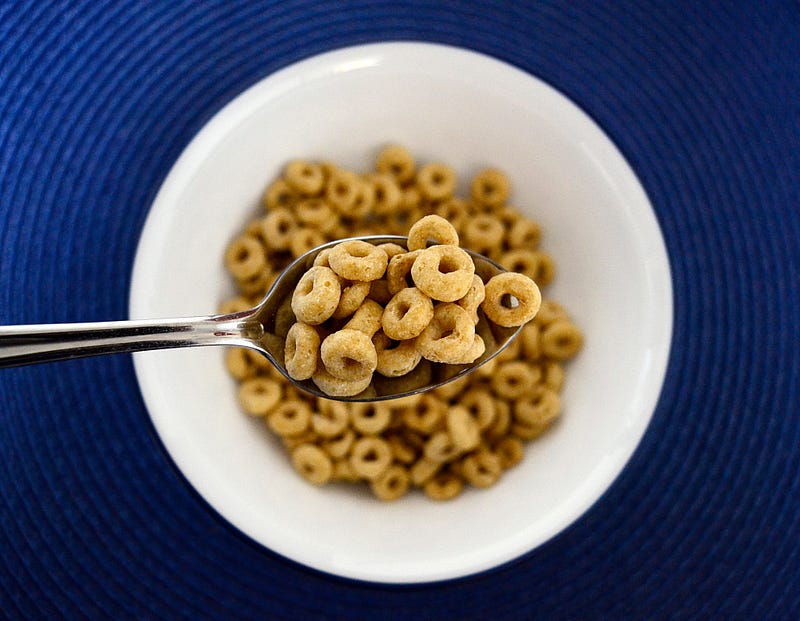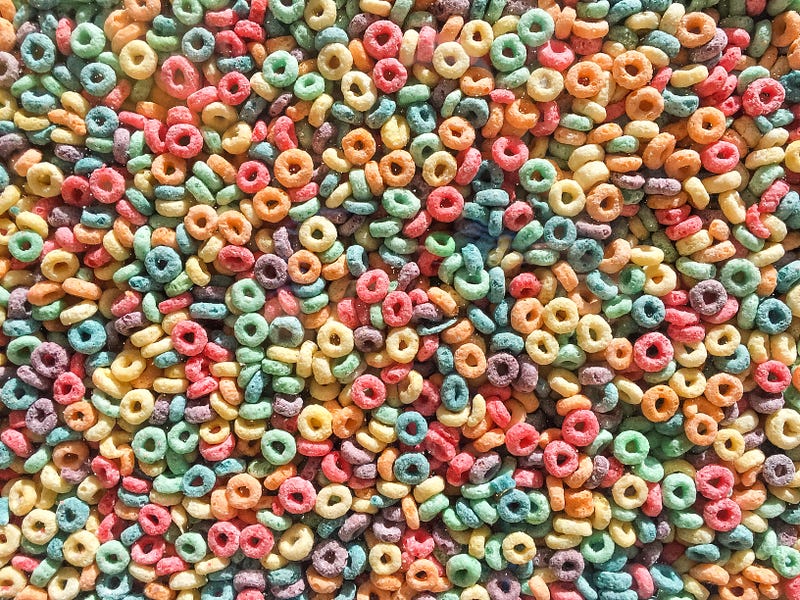 |
| Photo by Ismael Trevino on Unsplash |
What do you eat for breakfast every morning? Nothing but cereals?
Well, be rest assured, you’re not alone. Cold cereals are a very convenient and easy food. Proponents of cereals claim it has lots of health benefits. But the question is, “are they as healthy as claimed?”
Several studies have shown that an early breakfast improves satiety and helps you snack less during the day. But eating only carbs at breakfast might be detrimental to your health needs. You’re better off adding some protein and fat as well.
So, in this article, we’ll see which is a healthier alternative for breakfast: cereals or eggs?
What is cereal?
Breakfast cereal is produced from grains. Most cereals are fortified with minerals and vitamins. They’re usually eaten with yogurt, milk, nuts, or fruits (1).
 |
| Photo by Deena Englard on Unsplash |
So, how are breakfast cereals made? Typically, they are made by:
1. Processing: The food manufacturer processes the grains into fine flour and cooks them.
2. Extrusion: Some breakfast cereals are produced via an extrusion process. During extrusion, the cereal is shaped with a machine that uses a high-temperature process.
3. Mixing: Grains are crushed into flour. The flour is mixed with ingredients such as water, cocoa, and sugar.
4. Drying: The processed cereal is dried
5. Shaping: The cereal is cut into shapes like stars, bells, rectangles, or loops.
Some breakfast cereals may be shredded, flaked, or even puffed before they’re dried.
So, what’s the problem with breakfast cereals?
Well, there’s nothing as terrific in the modern diet as added sugar. And there are loads of it in breakfast cereals.
You see, added sugar contributes to chronic Qdiseases, and the thing is — we’re simply eating plenty of it (2, 3, 4).
Most of the added foods come from heavily processed foods — and the foods with the highest amount of added sugars are breakfast cereals, followed by soft drinks.
If you check well, you’ll see that sugar is almost always the second or third ingredient in breakfast cereals.
When you eat cereals for breakfast, you’ll cause your insulin and blood sugar levels to spike. Shortly after, your blood sugar level crashes, causing your body to crave another snack or meal rich in carbs. This ultimately causes you to overeat all the time (5).
Eating a lot of sugar also increases your risk of cancer, heart disease, and type 2 diabetes (6, 7, 8).
Most breakfast cereals are advertised with misleading health claims
Yes, a lot of breakfast cereals are advertised as being healthy. You’ll most likely see colorful ads with notes like “whole grain” and “low fat.” But a look at their listed ingredients shows refined sugar and grains as the very first ingredients.
 |
| Photo by Etienne Girardet on Unsplash |
Here’s the thing — small amounts of grains do not in any way increase the health benefits of these cereals. These health claims only serve as an effective way to trick people into thinking that these food products are healthy.
Children are more at risk because breakfast cereals are often marketed to them.
Many cereal manufacturers target children. These food manufacturers use cartoons, action figures, and even bright colors to catch children's attention.
This explains why many children associate cereals with fun and entertainment.
Imagine if they made it illegal to use fictitious, cartoon characters to market processed foods.
It also alters the taste preferences of these kids. Many children would rather go for foods that have well-known cartoon characters on the packaging.
What’s more? Eating processed, sugary food increases the risk of childhood obesity and other diseases.
What you should do is add PROTEIN to your breakfast
Protein is a vital macronutrient. It reduces appetite and increases satiety.
Proteins affect the levels of several hormones, like ghrelin, the hunger hormone, and peptide YY, the fullness hormone (9, 10).
Eggs are an excellent source of extra protein. They are one of the most nutritious foods on earth. They also contain cholesterol which is needed for a healthy lifestyle. Read this to learn about why “bad” LDL is actually needed for your body to function optimally.
The nutrients packed in a single egg are enough to cause a single cell to develop into a full live chicken.
According to Nutrition Data, the nutrients contained in one boiled egg include:
· Folate — 5% of the recommended dietary allowance (RDA)
· Vitamin A — 6% of the RDA
· Selenium — 22% RDA
· Phosphorus — 9% RDA
· Vitamin B12–9% RDA
· Vitamin B5–7% RDA
· Vitamin B2–15% RDA
 |
| Photo by Zachariah Smith on Unsplash |
Eggs are also rich in vitamin E, K, D, and B6 and zinc and calcium.
This is packed with 6g of protein, 77 calories, and 5g of fats. There are also vital trace nutrients in fats — and they’re great for your health.
Eggs are perfect. They contain a bit of every nutrient that your body requires.
Make sure you buy eggs that clearly stated they are pasture-raised. They’re the best kind. These eggs are loaded with healthy, omega-3 fats and are enriched with vitamins A and E (11).
References
1. Whittaker, P., Tufaro, P. R., & Rader, J. I. (2001). Iron and folate in fortified cereals. Journal of the American College of Nutrition, 20(3), 247–254. https://doi.org/10.1080/07315724.2001.10719039
2. Te Morenga, L., Mallard, S., & Mann, J. (2012). Dietary sugars and body weight: systematic review and meta-analyses of randomized controlled trials and cohort studies. BMJ (Clinical research ed.), 346, e7492. https://doi.org/10.1136/bmj.e7492
3. Basciano, H., Federico, L., & Adeli, K. (2005). Fructose, insulin resistance, and metabolic dyslipidemia. Nutrition & metabolism, 2(1), 5. https://doi.org/10.1186/1743-7075-2-5
4. Johnson, R. K., Appel, L. J., Brands, M., Howard, B. V., Lefevre, M., Lustig, R. H., Sacks, F., Steffen, L. M., Wylie-Rosett, J., & American Heart Association Nutrition Committee of the Council on Nutrition, Physical Activity, and Metabolism and the Council on Epidemiology and Prevention (2009). Dietary sugars intake and cardiovascular health: a scientific statement from the American Heart Association. Circulation, 120(11), 1011–1020. https://doi.org/10.1161/CIRCULATIONAHA.109.192627
5. Roberts S. B. (2000). High-glycemic index foods, hunger, and obesity: is there a connection? Nutrition reviews, 58(6), 163–169. https://doi.org/10.1111/j.1753-4887.2000.tb01855.x
6. Weeratunga, P., Jayasinghe, S., Perera, Y., Jayasena, G., & Jayasinghe, S. (2014). Per capita sugar consumption and prevalence of diabetes mellitus — global and regional associations. BMC public health, 14, 186. https://doi.org/10.1186/1471-2458-14-186
7. Stanhope, K. L., Schwarz, J. M., & Havel, P. J. (2013). Adverse metabolic effects of dietary fructose: results from the recent epidemiological, clinical, and mechanistic studies. Current opinion in lipidology, 24(3), 198–206. https://doi.org/10.1097/MOL.0b013e3283613bca
8. Seely, S., & Horrobin, D. F. (1983). Diet and breast cancer: the possible connection with sugar consumption. Medical hypotheses, 11(3), 319–327. https://doi.org/10.1016/0306-9877(83)90095-6
9. Paddon-Jones, D., Westman, E., Mattes, R. D., Wolfe, R. R., Astrup, A., & Westerterp-Plantenga, M. (2008). Protein, weight management, and satiety. The American journal of clinical nutrition, 87(5), 1558S–1561S. https://doi.org/10.1093/ajcn/87.5.1558S
10. Blom, W. A., Lluch, A., Stafleu, A., Vinoy, S., Holst, J. J., Schaafsma, G., & Hendriks, H. F. (2006). Effect of a high-protein breakfast on the postprandial ghrelin response. The American journal of clinical nutrition, 83(2), 211–220. https://doi.org/10.1093/ajcn/83.2.211
11. Samman S, Kung F, Carter L, et al. (2009). Fatty acid composition of certified organic, conventional, and omega-3 eggs. Food Chemistry, 116(4), 911–914